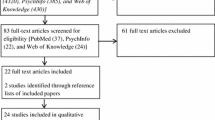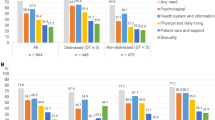Abstract
Purpose
Delays initiating cancer therapy are increasingly common, impact outcomes, and have implications for health equity. However, it remains unclear (1) whether patients’ beliefs regarding acceptable diagnostic to treatment intervals align with current guidelines, and (2) to what degree psychological factors contribute to longer intervals. We conducted a qualitative study with patients and cancer care team members (“providers”).
Methods
We interviewed patients with several common solid tumors as well as providers. Interviews were analyzed using an interpretive approach, guided by modified grounded theory.
Results
Twenty-two patients and 12 providers participated. Half of patients had breast cancer; 27% waited >60 days between diagnosis and treatment. Several themes emerged. (1) Patients felt treatment should begin immediately following diagnosis, while providers’ opinion on the goal timeframe to start treatment varied. (2) Patients experienced psychological distress while waiting for treatment. (3) Participants identified logistical, social, and psychological sources of delay. Fear related to multiple aspects of cancer care was common. Emotion-driven barriers could manifest as not taking steps to move ahead, or as actions that delayed care. (4) Besides addressing logistical challenges, patients believed that education and anticipatory guidance, from their care team and from peers, may help overcome psychological barriers to treatment and facilitate the start of therapy.
Conclusions
Patients feel an urgency to start cancer therapy, desiring time frames shorter than those included in guidelines. Psychological distress is frequently both a contributor to, and a consequence of, treatment delays. Addressing multilevel barriers, including psychological ones, may facilitate timely treatment and reduce distress.
Similar content being viewed by others
Data availability
Interview data are not shared due to privacy and ethical restrictions.
References
American Cancer Society. How does the Reach To Recovery® program support people facing breast cancer? Accessed June 1, 2023. https://www.cancer.org/support-programs-and-services/reach-to-recovery.html
American College of Surgeons. NCDB announces new breast quality measure. Accessed April 4, 2023. https://www.facs.org/for-medical-professionals/news-publications/news-and-articles/cancer-programs-news/063022/ncdb-announces-new-breast-quality-measure/.
Bilimoria KY, Ko CY, Tomlinson JS, Stewart AK, Talamonti MS, Hynes DL, Winchester DP, Bentrem DJ (2011) Wait times for cancer surgery in the United States. Ann Surg 253:779–785
Bleicher RJ, Ruth K, Sigurdson ER, Beck JR, Ross E, Wong YN, Patel SA, Boraas M, Chang EI, Topham NS, Egleston BL (2016) Time to surgery and breast cancer survival in the United States. JAMA Oncol 2:330–339
Bluethmann SM, Mariotto AB, Rowland JH (2016) Anticipating the “Silver Tsunami”: prevalence trajectories and comorbidity burden among older cancer survivors in the United States. Cancer Epidemiol Biomarkers Prev 25:1029–1036
Commission on Cancer. Optimal resources for rectal cancer care: 2020 standards. Accessed January 26, 2023. https://www.facs.org/media/nj2i4frt/optimal_resources_for_rectal_cancer_care_2020_standards.pdf
Creswell JW, Poth CN (2017) Qualitative inquiry and research design: choosing among five approaches. SAGE Publications, Inc
Damschroder LJ, Aron DC, Keith RE, Kirsh SR, Alexander JA, Lowery JC (2009) Fostering implementation of health services research findings into practice: a consolidated framework for advancing implementation science. Implement Sci 4:1–15
de Nooijer J, Lechner L, de Vries H (2001) A qualitative study on detecting cancer symptoms and seeking medical help; an application of Andersen’s model of total patient delay. Patient Educ Couns 42:145–157
Dubayova T, van Dijk JP, Nagyova I, Rosenberger J, Havlikova E, Gdovinova Z, Middel B, Groothoff JW (2010) The impact of the intensity of fear on patient’s delay regarding health care seeking behavior: a systematic review. Int J Public Health 55:459–468
Egleston BL, Bleicher RJ, Fang CY, Galloway TJ, Vucetic S (2023) Benefits versus drawbacks of delaying surgery due to additional consultations in older patients with breast cancer. Cancer Rep (Hoboken) 6(5):e1805. https://doi.org/10.1002/cnr2.1805
Fox Chase Cancer Center. Fox Chase Patient-to-Patient Network. Accessed June 1, 2023. https://www.foxchase.org/support/education-and-guides/resource-and-education-center/fox-chase-cancer-center-patient-patient-network
Frosch ZAK, Hasler J, Handorf E, DuBois T, Bleicher RJ, Edelman MJ, Geynisman DM, Hall MJ, Fang CY, Lynch SM (2023) Development of a multilevel model to identify patients at risk for delay in starting cancer treatment. JAMA Netw Open 6:e2328712
Frosch ZAK, Illenberger N, Mitra N, Boffa DJ, Facktor MA, Nelson H, Palis BE, Bekelman JE, Shulman LN, Takvorian SU (2021) Trends in patient volume by hospital type and the association of these trends with time to cancer treatment initiation. JAMA Netw Open 4:e2115675
Garcia D, Spruill LS, Irshad A, Wood J, Kepecs D, Klauber-DeMore N (2018) The value of a second opinion for breast cancer patients referred to a National Cancer Institute (NCI)-designated cancer center with a multidisciplinary breast tumor board. Ann Surg Oncol 25:2953–2957
Glaser BG, Strauss AL (1967) The discovery of grounded theory: strategies for qualitative research. Aldine Publishing, Chicago IL
Graboyes EM, Halbert CH, Li H, Warren GW, Alberg AJ, Calhoun EA, Nussenbaum B, Marsh CH, McCay J, Day TA, Kaczmar JM, Sharma AK, Neskey DM, Sterba KR (2020) Barriers to the delivery of timely, guideline-adherent adjuvant therapy among patients with head and neck cancer. JCO Oncol Pract 16:e1417–e1432
Gray RE, Fitch MI, Phillips C, Labrecque M, Klotz L (1999) Presurgery experiences of prostate cancer patients and their spouses. Cancer Pract 7:130–135
Iversen LH, Antonsen S, Laurberg S, Lautrup MD (2009) Therapeutic delay reduces survival of rectal cancer but not of colonic cancer. Br J Surg 96:1183–1189
Jones RVH, Greenwood B (1994) Breast cancer: causes of patients’ distress identified by qualitative analysis. Br J Gen Pract 44:370–371
Keitel MA, Zevon MA, Rounds JB, Petrelli NJ, Karakousis C (1990) Spouse adjustment to cancer surgery: distress and coping responses. J Surg Oncol 43:148–153
Khorana AA, Bolwell BJ (2019) Reducing time-to-treatment for newly diagnosed cancer patients. NEJM Catalyst 5(1). https://doi.org/10.1056/CAT.19.0010
Khorana AA, Tullio K, Elson P, Pennell NA, Grobmyer SR, Kalady MF, Raymond D, Abraham J, Klein EA, Matthew Walsh R, Monteleone EE, Wei W, Hobbs B, Bolwell BJ (2019) Time to initial cancer treatment in the United States and association with survival over time: an observational study. PLoS One 14:1–15
Kiemen A, Czornik M, Weis J (2023) How effective is peer-to-peer support in cancer patients and survivors? A systematic review. J Cancer Res Clin Oncol 149(11):9461–9485. https://doi.org/10.1007/s00432-023-04753-8
Korsgaard M, Pedersen L, Sørensen HT, Laurberg S (2006) Delay of treatment is associated with advanced stage of rectal cancer but not of colon cancer. Cancer Detect Prev 30:341–346
LaCasce AS, Kho ME, Friedberg JW, Niland JC, Abel GA, Rodriguez MA, Czuczman MS, Millenson MM, Zelenetz AD, Weeks JC (2008) Comparison of referring and final pathology for patients with non-Hodgkin’s lymphoma in the National Comprehensive Cancer Network. J Clin Oncol 26:5107–5112
Miller SM (1995) Monitoring versus blunting styles of coping with cancer influence the information patients want and need about their disease. Implications for cancer screening and management. Cancer 76:167–177
Morse J (1995) The significance of saturation. In: Editor (ed)^(eds) Book The significance of saturation, City, pp. 147-149.
Ossowski S, Neeman E, Borden C, Stram D, Giraldo L, Kotak D, Thomas S, Suga JM, Lin A, Liu R (2022) Improving time to molecular testing results in patients with newly diagnosed, metastatic non-small-cell lung cancer. JCO Oncol Pract 18:e1874–e1884
Perales MA, Drake EK, Pemmaraju N, Wood WA (2016) Social media and the adolescent and young adult (AYA) patient with cancer. Curr Hematol Malig Rep 11:449–455
SEER. Cancer stat facts: common cancer sites. National Cancer Institute. Accessed October 23, 2023, 2023. https://seer.cancer.gov/statfacts/html/common.html
Takvorian SU, Oganisian A, Mamtani R, Mitra N, Shulman LN (2020) Association of Medicaid expansion under the Affordable Care Act with insurance status , cancer stage , and timely treatment among patients with breast , colon , and lung cancer. JAMA Netw Open 3:1–13
Tong A, Sainsbury P, Craig J (2007) Consolidated criteria for reporting qualitative research (COREQ): a 32-item checklist for interviews and focus groups. Int J Qual Health Care 19:349–357
Wagner EH, Ludman EJ, Aiello Bowles EJ, Penfold R, Reid RJ, Rutter CM, Chubak J, McCorkle R (2014) Nurse navigators in early cancer care: a randomized, controlled trial. J Clin Oncol 32:12–18
Wercholuk AN, Parikh AA, Snyder RA (2022) The road less traveled: transportation barriers to cancer care delivery in the rural patient population. JCO Oncol Pract 18(9):652–662. https://doi.org/10.1200/OP.22.00122
Funding
This work was funded by a Conquer Cancer – Herman H. Freckman, MD, Endowed Young Investigator Award.
Author information
Authors and Affiliations
Contributions
Conceptualization: ZAKF, CYF; study design: all authors; data curation: LMJ, CSO, ACB, CJM; formal analysis: ZAKF, LMJ, CSO, CYF; funding acquisition: ZAKF; investigation: all authors; methodology: all authors; project administration: LMJ, CSO, ACB, CJM; resources: ZAKF, CYF; supervision: ZAKF, CYF; writing — original draft: ZAKF, LMJ, CSO, CYF; writing — review and editing: all authors.
Corresponding author
Ethics declarations
Ethical approval
This study was approved by the Fox Chase Cancer Center Institutional Review Board (#21-8013).
Informed consent
All participants provided informed consent to participate in this study.
Competing interests
Dr. Frosch reports grants from the Conquer Cancer Foundation of ASCO in support of this study and the following unrelated to the conduct of this study: Advisory Board fees from Seagen, research funds to institution from Roche, AstraZenica, and Abbvie. Dr Lynch reported personal fees from Beautycounter for serving as a consultant outside the submitted work. Dr Hall reports serving on advisory boards for Natera and Eisai outside the submitted work. Dr Edelman reports serving as a member of data safety monitoring boards for AstraZeneca, Takeda, GlaxoSmithKline, Seagen; serving on advisory boards for GE Health Care, Omega Therapeutics, BioAltaBioAtla, Regeneron/Sanofi, Novocure, InterVenn, Flame; and holding stock options for Creatv MicrotTech, all outside of the submitted work. Dr. Bleicher reports consulting fees for Elucent Medical unrelated to this study.
Disclaimer
Any opinions, findings, and conclusions expressed in this material are those of the author(s) and do not necessarily reflect those of the American Society of Clinical Oncology or Conquer Cancer.
Additional information
Publisher’s note
Springer Nature remains neutral with regard to jurisdictional claims in published maps and institutional affiliations.
Supplementary information
ESM 1
(DOCX 14 kb)
Rights and permissions
Springer Nature or its licensor (e.g. a society or other partner) holds exclusive rights to this article under a publishing agreement with the author(s) or other rightsholder(s); author self-archiving of the accepted manuscript version of this article is solely governed by the terms of such publishing agreement and applicable law.
About this article
Cite this article
Frosch, Z.A.K., Jacobs, L.M., O’Brien, C.S. et al. “Cancer’s a demon”: a qualitative study of fear and multilevel factors contributing to cancer treatment delays. Support Care Cancer 32, 13 (2024). https://doi.org/10.1007/s00520-023-08200-9
Received:
Accepted:
Published:
DOI: https://doi.org/10.1007/s00520-023-08200-9




